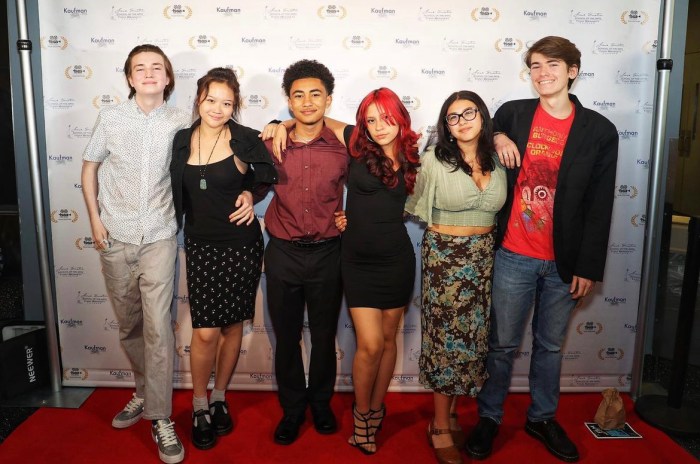By Raphael Sugarman
When New Yorkers think of city avenues named after letters of the alphabet, Brooklyn or Manhattan’s Lower East Side usually come to mind. So when the acclaimed musical “Avenue Q” first hit Broadway in 2003, borough−centric Manhattan and Brooklyn residents could certainly be forgiven for thinking that the show was a paean to their beloved native soil (though neither borough actually has an Avenue Q).
But after spending more than two highly enjoyable hours at the Golden Theatre, revisiting the puckish puppets and gifted actors who still have the musical going strong after six years, it is hard not to conclude that the Q in “Avenue Q” could appropriately stand for Queens.
For beneath all its wonderful silliness, “Avenue Q” has a prevailing message of tolerance and diversity, inclusiveness of race and culture and sexual orientation. And while it’s true that many parts of Gotham can boast a high level of diversity and broadmindedness, there is no place in the city — perhaps the world — that is quite the cultural paella as Queens.
It is also apropos, then, that two of the leading performers currently starring in “Avenue Q” are Queens residents.
Christian Anderson of Sunnyside has been part of the production for much of the past 3 1⁄2 years. Anderson plays several puppet parts in “Avenue Q,” including the adorable Nicky, a well−meaning ne’er−do−well; Trekkie Monster, a furry beast with a fuchsia afro, who is addicted to Internet porn; and one of the Bad Idea Bears, whose sole purpose seems to be trying to convince the other characters to make the most irresponsible life choices imaginable.
Carey Anderson, of Long Island City, has puppet roles that may be the most challenging. Carey plays both the innocent and cherubic Kate Monster, a kindergarten teaching assistant; and Lucy, a bodacious and bejeweled torch singer who competes with Kate for Princeton’s affection. At more than one point during the production, Carey has to play both roles during the same scene — no small chore.
“If I were just playing a regular human show, it would be kind of impossible to have a scene with yourself, but when you have these puppets, it adds a whole other element to the art form,” she said.
Some of the other puppet neighbors on “Avenue Q” include Princeton, an enthusiastic college grad searching for his calling; and Rod, a Republican investment banker and Nicky’s roommate. There is also Brian, an unemployed comedian, and his fiancÉe, Christmas Eve, played by Queens resident Ann Sanders. The building’s superintendent is Gary Coleman, from TV’s “Different Strokes,” portrayed by a female actor.
Perhaps “Avenue Q”’s greatest feat is that its actors work their puppet characters onstage with no attempt to hide their moving lips or other gestures.
“I want them to watch the puppet, but then I want them to refer to my face,” said Christian Anderson. “I want them to think that the puppet is alive and forget about the puppeteer. But, maybe, if they look at me once and a while and see happiness, sadness or fright, they will incorporate that onto Nicky’s big, open face. They will look at me for extra hints as to what Nicky is going through.”
Both Christian and Carey said they never imagined how difficult it would be learn to work a puppet — and how rewarding.
“They send you to an intensive puppet course and you work on the puppeteering stuff for a couple of weeks,” said Carey. “It has been six months and I will still do something new every night. You have to dissect everything, even a breath. We spent two days in puppet camp on breathing … It’s amazing what can go into these things that look effortless.”
The childlike countenance of the puppets also allowed the creators of “Avenue Q” to include issues and gags in the script that would never have been possible with a strictly “human” cast.
“Songs like ‘Everyone’s a Little Bit Racist,’” said Christian, citing an example of one of the show’s edgier songs. “You can’t blame the puppets … for some reason they are allowed to say these things that we aren’t. I think its great.”
Christian grew up in Connecticut. His father is also an actor, currently performing in a play in Manhattan by the Blue Coyote Theater Group. His mother is a director. Christian has always been a big fan of Jim Henson and the Muppets and has yearned to work with puppets.
“When I found out that they were doing this show, I thought, ‘I have got to be part of it somehow,’” he said.
He has performed in the Broadway production and national tour of “Rent,” the Broadway production of “High Fidelity” and the tour of “The Full Monty,” among other shows.
Carey is a proud Midwestern girl from Indiana, who said she shares a lot in common with Kate Monster and can hardly fathom Lucy’s brazenness.
She was the longest−running Sophie in Broadway’s “Mamma Mia” and has done such regional productions as “South Pacific,” “Baby,” “The Taffetas” and “Picnic at Hanging Rock.”
Though only in the production for a few months, she already has a good understanding of the nature of “Avenue Q.”
“It is very selfless, this job. You can’t have a lot of ego working with these little furry creatures. They are inanimate objects, but they steal the show, and that is the purpose. You give them your heart so they can come alive.”
“Avenue Q” is playing at the Golden Theatre. 252 W. 45 St.
Worth the Trip
“33 Variations”: When it was announced that Jane Fonda would make a return to the Broadway stage after a decades−long absence, the show instantly became perhaps the hottest ticket in town. Fonda is wonderful in her depiction of Dr. Katherine Grant, the dying scholar in search of the life and motivations of Ludwig van Beethoven.
But there is also a great deal else to like about this show. Playwright and director MoisÉs Kaufman has penned an extremely thoughtful story and designer Derek McLane has put together an attractive and impressively adaptable set.
It is gratifying, and all too rare, to have an evening at the theater that provokes robust conversation with one’s companions about a production, not to mention a good deal of private reflection about its life−lessons. “33 Variations” will engender both. A limited engagement until May 24, at the Eugene O’Neill Theatre, 230 W. 49 St.
Elvis Perkins: When your father was famed actor Anthony Perkins, who starred in the classic film “Psycho,” and your mother was photographer Berry Berenson, whose work regularly appeared in Life magazine and who perished on Sept. 11 aboard one of the airplanes that crashed into the Twin Towers, one would think it would be a bit difficult to carve out a unique name for yourself.
But Elvis Perkins has managed to do just that, with the release of his CD “Ash Wednesday” in 2007 and the just−released “Elvis Perkins in Dearland.” Whether because of his unique family background or in spite of it, Perkins is a particularly sensitive and memorable recording artist and performer.
Perkins and his band have scheduled a tour to support their new album, which will include a stop at Manhattan’s Bowery Ballroom on March 25. There is also a rumor of another local show, at Brooklyn’s Bell House on May 20.
The Bowery Ballroom is at 6 Delancey St., 212−533−2111. The Bell House is at 149 7th St., 718−643−6510.































